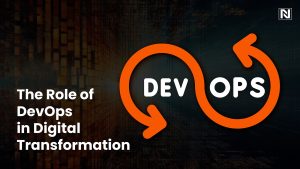
DevOps is emerging as the unsung digital transformation hero in a world where speed and agility are key. By merging the strengths of development and operations, DevOps promises faster innovation and more reliable results.
But how exactly does this approach power the shift to a digital-first mindset? Let’s explore the transformative impact of DevOps in digital transformation.
What is Digital Transformation?
Digital transformation involves utilizing digital technologies to innovate or enhance business processes, organizational culture, and customer engagement. It goes beyond merely implementing new tools, and it’s a comprehensive strategy that affects every aspect of an organization. The goal is to increase agility, efficiency, and customer focus by harnessing data and technology to fuel innovation and growth.
What is DevOps?
DevOps is a unified approach that combines development (dev) and operations (ops) teams to design, develop, and rapidly deploy secure software. DevOps accelerates the software delivery lifecycle by fostering collaboration, automating processes, enabling quick feedback, and continuously improving.
The Role of DevOps in Digital Transformation
In the traditional approach, development teams often work in isolation, focusing on coding, building, and testing without much interaction with other departments. Once their work is complete, they pass the code to the operations team for deployment. However, this method often leads to slower release cycles and communication gaps.
So, how does DevOps play a role in digital transformation? DevOps bridges the gaps inherent in traditional processes by fostering a collaborative culture across all teams. This synergy accelerates digital transformation, driving an organization forward in its journey. Let’s explore how DevOps aligns with digital transformation.
- Reinventing Development and Delivery
DevOps revolutionizes traditional software development and delivery methods by fostering collaboration across teams and eliminating the barriers that often hinder digital transformation. By integrating agile practices with automation and cloud technologies, DevOps enables organizations to scale operations efficiently while maintaining high-quality standards.
Automated testing minimizes human error during deployments, ensuring reliable system performance. With continuous integration and continuous delivery (CI/CD), DevOps allows companies to swiftly introduce new features that cater to customer needs, all while reducing the risks of downtime during updates or upgrades.
- Challenging Traditional Mindsets
DevOps introduces a cultural shift by challenging the traditional division between development and operations teams. Traditionally, developers concentrated on coding with little regard for operational impacts, while operations personnel focused on system stability, sometimes stifling innovation.
DevOps bridges this gap by promoting collaboration and mutual understanding, leading to a unified team working toward shared objectives. This collaborative atmosphere optimizes processes, drives innovation, and enhances productivity.
- Integrating People, Process, and Tech
The strength of DevOps lies in its ability to integrate people, processes, and technology into a unified framework for digital transformation. Cross-functional teams work together to develop and deliver software more rapidly and effectively. DevOps emphasizes automating the entire development lifecycle, reducing errors, and ensuring smooth operations.
Technology, particularly automation tools like configuration management and CI/CD systems, is central to this transformation. DevOps ensures products meet customer demands by prioritizing customer feedback and delivering value quickly while accelerating time-to-market for new features.
- Driving Continuous Improvement
DevOps acts as a catalyst for ongoing improvement within organizations. By dismantling silos and promoting collaboration and transparency, DevOps empowers cross-functional teams to work more cohesively. Continuous integration (CI) facilitates frequent code merging, allowing for early issue detection and resolution, while continuous delivery (CD) ensures consistent and safe deployment of software changes to production.
Using infrastructure as code (IaC) and automated testing further enhances reliability and minimizes manual effort, allowing organizations to focus on innovation and ongoing enhancement.
Did You Know?
According to Markets and Markets, The DevOps market is projected to expand at a robust CAGR of 19.7% throughout the forecast period, increasing from approximately USD 10.4 billion in 2023 to USD 25.5 billion by 2028.
According to Statista, In 2022, nearly 47 percent of respondents reported utilizing DevOps or DevSecOps methodologies for software development, highlighting the essential role of DevOps in digital transformation.
- Fostering Innovation and Autonomy
DevOps encourages organizations to steer themselves toward better solutions by cultivating a continuous evaluation and improvement culture. By breaking down silos and enhancing cross-departmental collaboration, DevOps enables teams to identify and resolve issues quickly and creatively.
Automation tools amplify this process by reducing errors and boosting efficiency. This continuous improvement mindset allows companies to swiftly adapt to customer demands and maintain a competitive edge.
- Prioritizing Automation
Automation is the cornerstone of DevOps, streamlining processes and reducing manual effort. DevOps enhances productivity by automating tasks such as testing, deployment, and monitoring and ensuring consistent, high-quality outcomes.
Backed by automation, CI/CD practices allow organizations to seamlessly build, test, and deploy code changes across various environments with minimal human involvement. This approach conserves time and resources and guarantees secure and efficient operations.
- Enabling Continuous Change
Continuous and incremental change is crucial in the realm of digital transformation. DevOps supports regular updates, enabling organizations to adapt their systems rapidly to meet evolving customer needs. This approach encourages experimentation and innovation, allowing teams to test new ideas with minimal resource investment.
Automation tools further simplify this process by streamlining development tasks and minimizing the risk of errors. Ultimately, DevOps empowers organizations to stay competitive by implementing changes swiftly and efficiently, with minimal disruption.
The Future of DevOps in Digital Transformation
Now that you’re familiar with how DevOps can enhance your digital transformation, let’s examine its potential future developments and impact. 
- Enhanced Automation
Automation is at the heart of DevOps and will continue to be a driving force in the future. As technology advances, automation tools will become more sophisticated, enabling seamless integration and continuous delivery pipelines. This will reduce manual intervention, minimize errors, and speed up development cycles.
- AI and Machine Learning
AI and machine learning are set to revolutionize DevOps by enhancing predictive analytics, automated testing, and intelligent monitoring. AI-driven insights will help teams proactively identify issues, optimize performance, and make data-informed decisions, leading to more efficient and reliable deployments.
- Security (DevSecOps)
With increasing cybersecurity threats, integrating security into the DevOps pipeline is becoming essential. DevSecOps, the practice of embedding security throughout the development lifecycle, will gain prominence. Automated security checks and compliance tools will ensure that security is an integral part of the development process rather than an afterthought.
- Use of Containers and Kubernetes
Containers and Kubernetes are transforming how applications are deployed and managed. The future will see more widespread adoption of these technologies, enabling consistent and scalable environments across different platforms. Containers will facilitate microservices architectures, which are key to modern digital transformation strategies.
- Serverless Architectures
Serverless computing, where cloud providers manage the infrastructure, will gain traction in DevOps. This model allows developers to focus on writing code without worrying about server management. As serverless architectures mature, they will play a significant role in accelerating digital transformation.
Case Studies
With a clearer grasp of how DevOps contributes to digital transformation and its prospects, let’s explore some case studies of renowned organizations that have successfully adopted DevOps practices.
Netflix
Over the past decade, Netflix has undergone a remarkable digital transformation, largely driven by its adoption of DevOps practices. This evolution has empowered Netflix to streamline processes and integrate advanced tools, enabling swift and efficient updates, bug fixes, and scalable infrastructure adjustments to accommodate its expanding user base.
Netflix’s DevOps approach is centered on its use of microservices architecture. This strategy involves decomposing the application into small, autonomous services that can be independently deployed, enhancing flexibility and scalability.
Automation plays a crucial role in Netflix’s DevOps framework. Netflix can rapidly deploy new service versions by leveraging containers and orchestration tools like Kubernetes. The company’s dedication to testing and continuous delivery ensures that bugs are quickly identified and resolved while new features are promptly made available to users.
This emphasis on agile development and deployment has allowed Netflix to maintain its competitive edge in the streaming industry and continue growing its user base.
Etsy
Etsy, an e-commerce platform, has recently embraced a significant digital transformation by adopting DevOps practices. To address the needs of its expanding user base, Etsy has implemented various tools and techniques to optimize the release of new features, bug fixes, and infrastructure scaling.
Etsy’s DevOps strategy’s cornerstone is continuous integration and delivery (CI/CD). Using tools such as Jenkins and Travis CI, Etsy automates the processes of building, testing, and deploying code, allowing for rapid detection and resolution of bugs and prompt release of new features.
Etsy also incorporates containers and orchestration tools like Kubernetes to facilitate quick deployment of service updates and efficient infrastructure scaling.
Monitoring and observability are vital components of Etsy’s approach. The company uses tools like Prometheus and Grafana for comprehensive service and infrastructure monitoring and relies on a team of site reliability engineers (SREs) to ensure optimal performance and maintenance.
Why is Nirvana Lab the Best Choice for DevOps?
At Nirvana Lab, we excel in integrating DevOps in Digital Transformation strategies to enhance your business operations. Recognized as one of the top DevOps consulting companies in the USA, we offer tailored solutions that streamline development and operations for improved efficiency.
Our approach emphasizes continuous integration and deployment (CI/CD), ensuring rapid and reliable software delivery. By aligning DevOps practices with your unique business needs, we foster collaboration and optimize workflows. Partnering with us means leveraging industry-leading expertise to drive transformative results.
Frequently Asked Questions
What is DevOps in digital transformation?
DevOps in digital transformation combines development and operations to accelerate software delivery. It fosters collaboration, automates processes, and integrates continuous feedback to enhance organizations’ agility, efficiency, and innovation.
How does DevOps enhance software development?
DevOps enhances software development by integrating agile practices, automating testing and deployment, and fostering team collaboration. This leads to faster releases, fewer errors, and higher-quality software.
What are the benefits of DevOps for businesses?
DevOps benefits businesses by accelerating development cycles, improving software quality, and enhancing team collaboration. It also supports continuous improvement, automation, and rapid adaptation to customer needs.
How does DevOps drive digital transformation?
DevOps drives digital transformation by breaking down traditional silos between development and operations, integrating people, processes, and technology, and enabling continuous improvement and innovation through automation and collaboration.
What are future trends in DevOps?
Future trends in DevOps include enhanced automation, AI and machine learning for predictive analytics, DevSecOps for integrated security, widespread use of containers and Kubernetes, and the adoption of serverless architectures for streamlined development.
Why should businesses choose Nirvana Lab for DevOps solutions?
Nirvana Lab offers expert DevOps consulting tailored to enhance business operations. Focusing on continuous integration and delivery, our solutions streamline development and operations, ensuring rapid and reliable software delivery. We leverage industry-leading practices to drive transformative results and improve efficiency.
